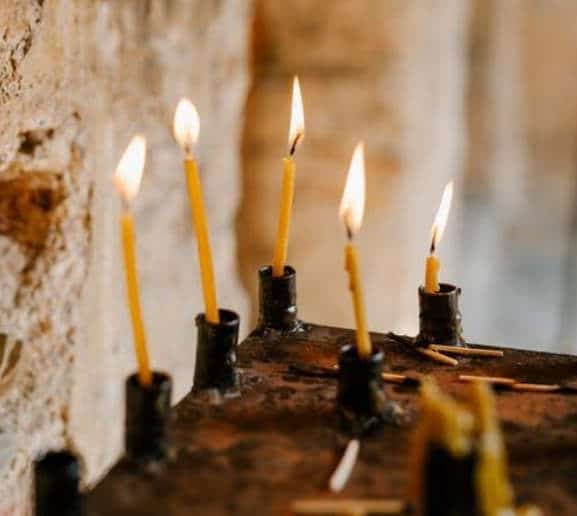Candles are perhaps one of the oldest inventions ever created by mankind. They have been in existence for thousands of years, first as a result of acute necessity for sources of indoor illumination and then later – in recent years – as a medium for aesthetics. The true origins of candles can be traced back to ancient Rome where the fat or tallow from animals were boiled down to make candle wax. However, the kinds of materials used to make candles have evolved over time to include paraffin wax, which is the most popular kind of candle wax used today.
WHAT IS A GLASS CANDLE?
The term “glass candle” does not refer to its literal meaning of a candle – or candlestick – made from glass, contrary to many people’s initial assumption. Rather, the term relates more to the type of candle holder. A glass candle is a normal type of candle, except for the fact that the candle-wax has been formed within a glass holder, inside which it burns. This definition may stump many people particularly when we consider the arrangement and use of the word “glass”. However, it is important to remember that glass is a substance that does not burn easily or melt easily, and so it would be difficult to use to form functional candle-sticks (except we are referring to ornaments or candlesticks of the ornamental category). Thus, it would be easier to remember the actual definition of glass candles.
Glass candles are usually scented candles, however they may also be unscented, as the use of glass as candle containers (or rather, candle-holders) does not automatically mean that the candle must be scented. However, the glass serves as a container and a permanent mold in which the raw melted material used to form the candle wax can be poured into and left to set. Glass candles are very popular in countries in America, Asia and Europe where homemade candles are usually produced. Glass candles may be homemade but they may also be produced commercially in a factory.
The most important part of glass candles is the glass and the type of materials used to make the glass plays a crucial role in the proper burning of the candles. This is because candles produce heat, as well as light, as they burn and the wrong type of glass can explode due to the action of this kind of heat.
WHY DO GLASS CANDLES EXPLODE?
Glass candles explode sometimes. This is a fact. However, it can also be a bit of a disaster. This is because explosions of any kind – including glass candles explosions – are not always pretty. When glass candles explode, pieces of glass may scatter everywhere. They may fall on surfaces such as tables and may get on the floor. If these pieces of glass are not gathered carefully, they may cause injuries. Explosions of glass candles may also involve wastage of candle-wax, because when glass candles explode, the blocks of candle-wax contained within them get exposed and the wax may start to melt haphazardly. The shattered pieces of glass may even find their way into the candle-wax to form slices or eventual breaks. In the worst of cases, the explosion of glass candles may eventually result in fire outbreaks, particularly in instances where the glass candles are left unguarded. In order to prevent such instances, it is important to understand why glass candles sometimes explode. Some of the top reasons for the explosion of glass candles include:
- The use of glass with low heat resistance
The use of glass or glass materials which have low resistance to heat in candle-making is perhaps the most prominent cause of glass candle explosions worldwide, particularly when homemade glass candles are involved. This is because many people who dabble into homemade candle-making are not usually aware of the fact that not every type of glass container can be used to make candles.
Naturally, glass does not mix well with heat or any kind of extreme temperature shift. This is because glass does not deal well with expansion (i.e. in the case of very high temperature) or contraction (i.e. in the case of very low temperature). This is why a glass cup will crack or shatter if you pour hot water in it, or place it in hot water. It is also the same reason why a glass cup will crack or shatter if you put it in the freezer for too long. Glass simply does not handle extreme shifts in temperature well.
However, there are some types of glass or glass materials that have been specially produced to withstand these kinds of significant shifts in temperature, especially when high temperatures are involved. They are called heat-resistant glass, and they are the most suitable materials for candle making (i.e. in the instance of glass candles). The reason for this is that candles tend to produce heat as well as light when they burn, and so the type of glass used to contain them must be very capable of withstanding that heat without cracking or shattering.
- The use of porous glass containers
Glass containers which have been cleaned with harsh cleaning materials over time may begin to develop small, microscopic holes. Cleaning supplies that are too acidic or too alkaline in nature may contribute to the occurrence of glass porosity. When this happens, the glass is said to be porous and porous glass has a very high tendency of shattering or cracking easily under the action of heat.
- The use of glass vases
Glass vases are not the most ideal materials for holding candle-wax in candle-making. This is because they are usually designed and manufactured for an entirely different purpose (i.e. for holding flowers and water). Many of them have not been specially designed to withstand heat and so they are not heat resistant. Thus, they may crack under the pressure of heat from burning candles or they may shatter. It is much safer to opt for heat-resistant glass and glass containers that have been specially designed to hold burning candles, during the process of candle-making.




